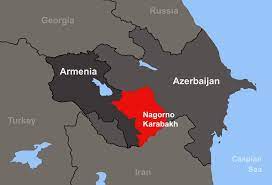Crisis in Caucasus
Armenia and Azerbaijan must work out a lasting ceasefire
The violent border clashes between Armenia and Azerbaijan have raised fears of another war in the Caucasus. The countries had fought a disastrous weeks-long war in 2020 over the disputed Nagorno-Karabakh region in which Azerbaijan made gains before Russia forced a ceasefire. Tensions remained with the occasional flare-ups, but Tuesday’s clashes were the deadliest since 2020. Armenia and Azerbaijan have accused each other of provocation, but the fighting, as per initial reports, took place on the Armenian side and Armenia took heavier casualties. It may not be a coincidence that the crisis broke out at a time when Russia, Armenia’s security ally, has been struggling to hold its gains in Ukraine. Armenia is a member of the Russia-led Collective Security Treaty Organisation, whose NATO-like charter stipulates that an attack against one member could be treated as an attack against all. Armenia had turned to Russia for help, but Moscow’s response was rather cautious — it called for de-escalation and claimed that it had brokered another ceasefire.
The dispute over Nagorno-Karabakh goes back to the pre-Soviet era. When the Soviet Union was formed, the Armenian majority enclave became part of the Azerbaijan Soviet Republic. When the Soviet Union collapsed and Armenia and Azerbaijan became independent republics, the clashes resurfaced. Armenian rebels in Nagorno-Karabakh fought off the Azeri forces and joined Armenia. But Azerbaijan never gave up its claims; nor did the two countries reach any peace agreement over the enclave. Unlike in the 1990s, Azerbaijan now looks economically and politically stronger. In the 2020 conflict, it got military and diplomatic assistance from Turkey while Russia was reluctant to get dragged into the conflict on behalf of Armenia. Now, Russia’s ability to project power in its neighbourhood appears to be further limited on account of Ukraine. On the other side, gas-rich Azerbaijan, which still has the backing of Turkey, is being courted by the EU for increased gas supplies. These regional developments seem to have emboldened Azerbaijan. But its ambition could be costly for everyone. Russia will find it difficult to retain its influence in Central Asia and Caucasus if it continues to ignore Armenia. At the same time, getting dragged into another battlefront would be challenging. A conflict in the Caucasus would further destabilise the global energy markets, hurting all economies, particularly energy-starved Europe. For Turkey, which is trying to balance between Russia and the West over Ukraine, another war in its neighbourhood would further complicate its foreign policy choices. The last thing the world needs now is another war. So, all sides should enforce a lasting ceasefire between Armenia and Azerbaijan and ensure calm in the troubled mountains of Nagorno-Karabakh.
